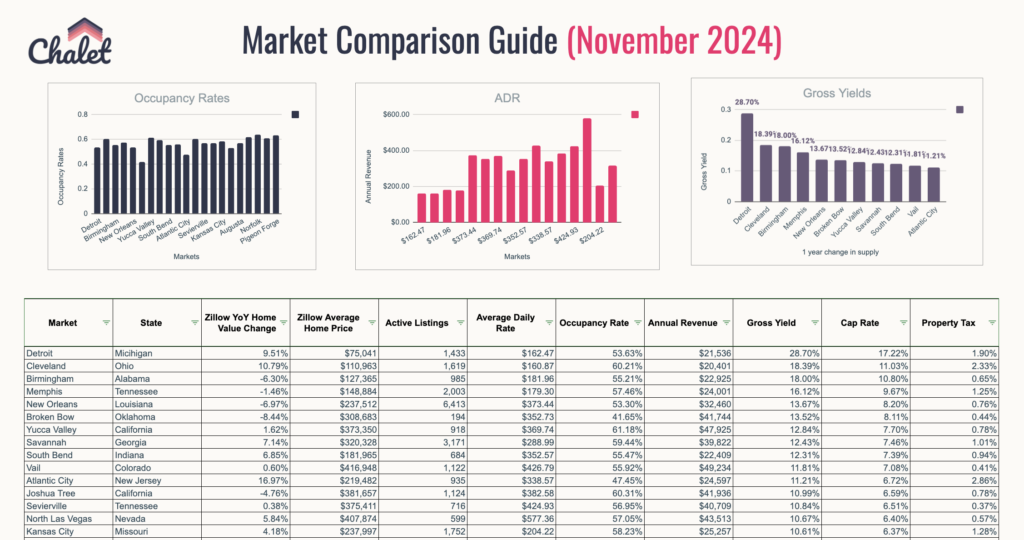Detroit, Michigan, often referred to as the Motor City, has seen a resurgence in tourism and economic activity in recent years. As the city continues to rebuild and rebrand itself, Airbnb and other short-term rental platforms have become increasingly popular. However, as with many cities, Detroit has established specific regulations to manage the impact of these rentals on neighborhoods and housing availability. This post will guide you through the current short-term rental regulations in Detroit, providing a comprehensive resource for property owners and potential investors.
Overview of Short-Term Rentals in Detroit
Airbnb and other short-term rental platforms offer a flexible lodging option for visitors and an income opportunity for property owners. However, to balance the benefits with potential downsides such as noise, safety, and housing shortages, Detroit has implemented regulations governing these rentals.
Key Regulations for Short-Term Rentals in Detroit
- Registration and Licensing
- Property owners must register their short-term rental with the City of Detroit. This registration process involves submitting an application and paying a fee.
- Owners must obtain a Certificate of Compliance from the Buildings, Safety Engineering, and Environmental Department (BSEED), ensuring the property meets all safety and zoning requirements.
- Primary Residence Requirement
- In Detroit, short-term rentals are only permitted in properties that are the owner’s primary residence. This regulation aims to prevent investors from converting multiple homes into short-term rentals, which can limit housing availability for long-term residents.
- Occupancy Limits
- The number of guests allowed in a short-term rental is typically limited to no more than two people per bedroom. This ensures the property is not overcrowded and maintains safety standards.
- Insurance and Liability
- Property owners are required to maintain liability insurance for their short-term rental. This coverage protects both the host and guests in case of accidents or damages.
- Tax Obligations
- Short-term rental income is subject to state and local taxes. Hosts must collect and remit the 6% Michigan Use Tax on all bookings. Airbnb often handles this automatically, but it’s the host’s responsibility to ensure compliance.
- Noise and Nuisance Regulations
- Detroit enforces strict noise ordinances to prevent disturbances in residential neighborhoods. Hosts are responsible for ensuring their guests adhere to these rules to avoid fines and penalties.
Compliance and Enforcement
The City of Detroit takes enforcement of short-term rental regulations seriously. Non-compliance can result in significant fines and even the revocation of rental permits. The city’s enforcement strategy includes routine inspections and a system for neighbors to report violations.
Top 200 Airbnb Rental Markets

Instantly compare top 200 short-term (Airbnb) rental markets in the US
Impact on the Detroit Community
These regulations aim to strike a balance between encouraging tourism and protecting the integrity of local neighborhoods. By restricting short-term rentals to primary residences, Detroit hopes to mitigate potential negative impacts on housing availability and neighborhood cohesion.
Resources for Detroit Airbnb Hosts
- City of Detroit Official Website: For detailed information on registration, licensing, and compliance, visit the City of Detroit’s short-term rental page.
- Michigan Department of Treasury: For guidance on tax obligations related to short-term rental income, visit the Michigan Treasury website.
- Airbnb Help Center: Airbnb provides resources and support for hosts to ensure they meet local regulations. Visit the Airbnb Help Center for more information.
Conclusion
Navigating the regulations surrounding short-term rentals in Detroit may seem daunting, but with the right knowledge and resources, it can be a manageable process. By adhering to these rules, hosts can contribute positively to Detroit’s growth while benefiting from the booming short-term rental market. Always stay informed about any regulatory changes to ensure ongoing compliance and to continue offering a safe, enjoyable experience for guests.
This long-form post aims to provide a thorough understanding of Detroit’s short-term rental regulations. If you’re considering becoming an Airbnb host in Detroit, make sure to stay up-to-date with local laws and leverage the available resources to ensure your rental complies with all necessary regulations.

